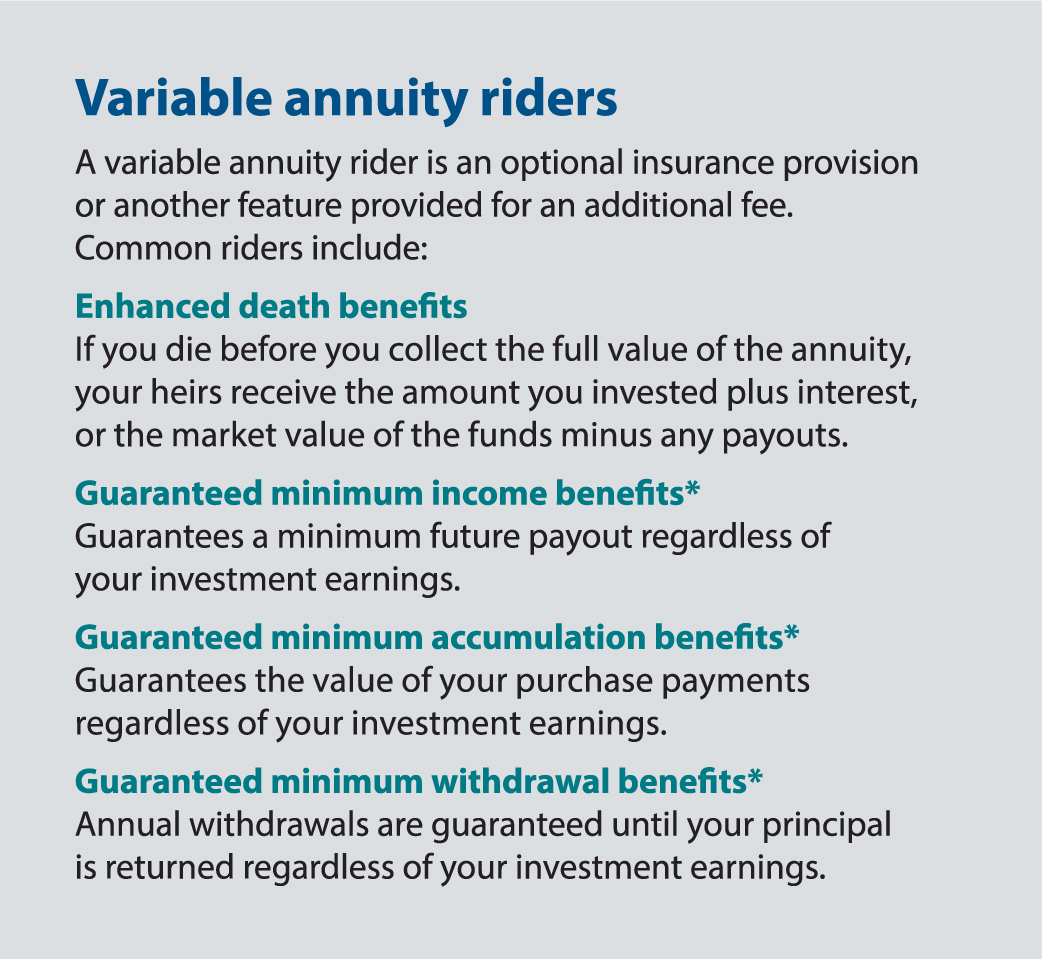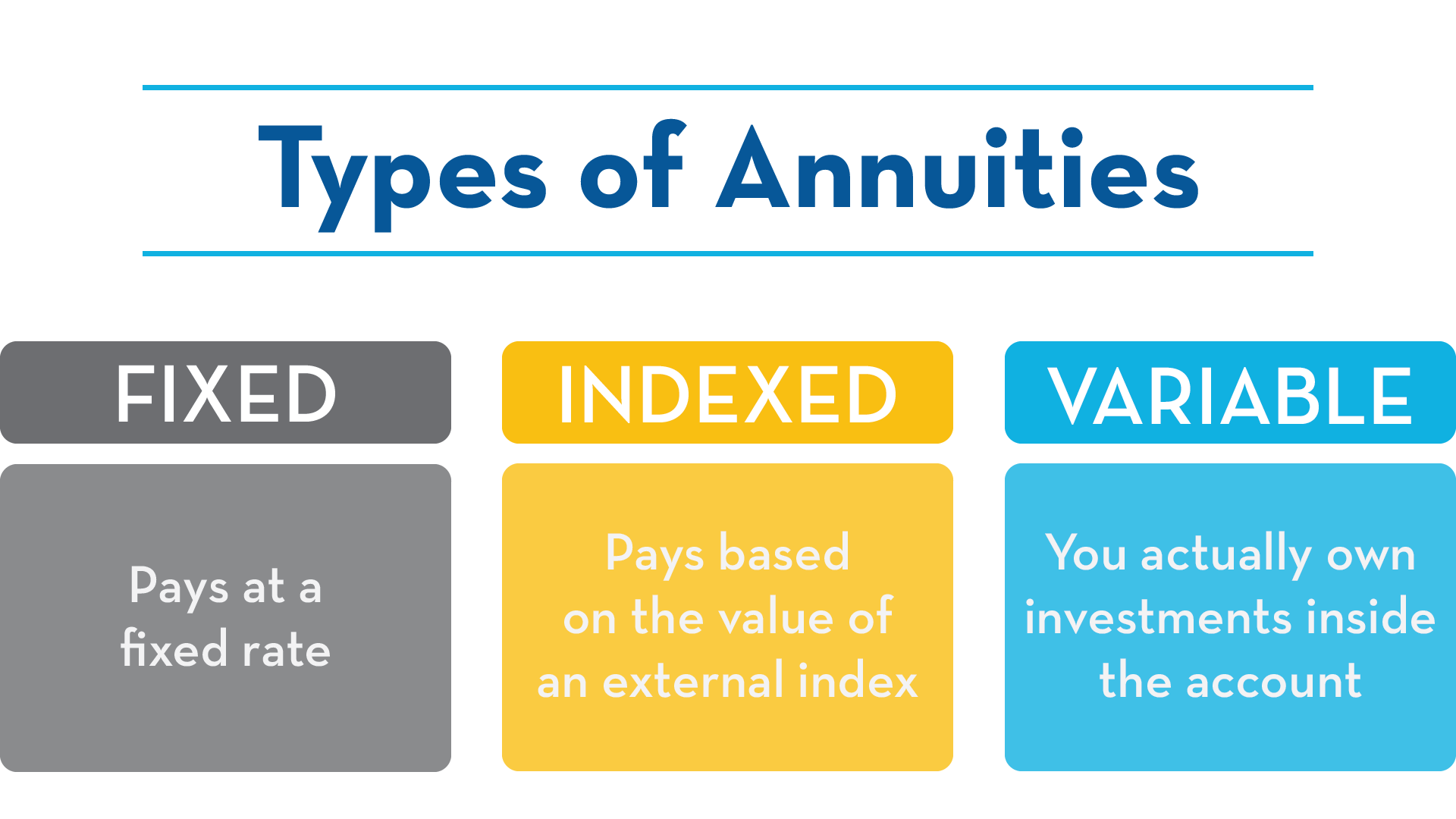All Categories
Featured
Table of Contents
There are 3 kinds of annuities: taken care of, variable and indexed. With a dealt with annuity, the insurance provider ensures both the rate of return (the rates of interest) and the payment to the capitalist. The rates of interest on a dealt with annuity can change with time. Typically the rate of interest is taken care of for a number of years and afterwards modifications regularly based on present rates.
With a deferred set annuity, the insurer accepts pay you no less than a specified price of rate of interest as your account is growing. With an immediate fixed annuityor when you "annuitize" your delayed annuityyou receive a predetermined fixed quantity of cash, normally on a monthly basis (comparable to a pension).
While a variable annuity has the benefit of tax-deferred growth, its yearly expenditures are most likely to be much more than the costs of a normal mutual fund. And, unlike a taken care of annuity, variable annuities don't provide any warranty that you'll make a return on your investment. Instead, there's a danger that you can really shed cash.
Decoding How Investment Plans Work A Comprehensive Guide to Investment Choices Breaking Down the Basics of Investment Plans Features of Variable Annuity Vs Fixed Indexed Annuity Why Choosing Between Fixed Annuity And Variable Annuity Is Worth Considering How to Compare Different Investment Plans: A Complete Overview Key Differences Between Fixed Annuity Or Variable Annuity Understanding the Rewards of Long-Term Investments Who Should Consider Pros And Cons Of Fixed Annuity And Variable Annuity? Tips for Choosing the Best Investment Strategy FAQs About Deferred Annuity Vs Variable Annuity Common Mistakes to Avoid When Planning Your Retirement Financial Planning Simplified: Understanding Your Options A Beginner’s Guide to Smart Investment Decisions A Closer Look at How to Build a Retirement Plan
Due to the complexity of variable annuities, they're a leading source of capitalist issues to FINRA. Before acquiring a variable annuity, very carefully read the annuity's program, and ask the individual marketing the annuity to describe every one of the product's attributes, motorcyclists, expenses and limitations. You need to additionally recognize how your broker is being made up, including whether they're getting a compensation and, if so, exactly how a lot.
Indexed annuities are complex monetary tools that have features of both dealt with and variable annuities. Indexed annuities usually offer a minimal guaranteed interest rate incorporated with a rates of interest linked to a market index. Numerous indexed annuities are connected to wide, widely known indexes like the S&P 500 Index. Some usage other indexes, consisting of those that stand for other segments of the market.
Comprehending the attributes of an indexed annuity can be complicated. There are several indexing techniques companies use to determine gains and, because of the variety and intricacy of the approaches made use of to credit passion, it's tough to contrast one indexed annuity to an additional. Indexed annuities are normally classified as one of the following two types: EIAs supply an assured minimum interest rate (generally a minimum of 87.5 percent of the premium paid at 1 to 3 percent interest), along with an extra rate of interest tied to the performance of several market index.

Conservative financiers who value safety and security and stability. Those nearing retired life who wish to sanctuary their assets from the volatility of the supply or bond market. With variable annuities, you can spend in a variety of safety and securities consisting of stock and bond funds. Stock exchange efficiency establishes the annuity's value and the return you will get from the cash you spend.
Comfy with changes in the stock market and desire your financial investments to maintain speed with rising cost of living over a long duration of time. Youthful and intend to prepare monetarily for retirement by reaping the gains in the supply or bond market over the long term.
As you're accumulating your retired life financial savings, there are lots of methods to stretch your cash. can be especially valuable savings devices because they assure an earnings amount for either a collection amount of time or for the rest of your life. Dealt with and variable annuities are two alternatives that supply tax-deferred growth on your contributionsthough they do it in different methods.
Breaking Down Fixed Annuity Vs Equity-linked Variable Annuity Everything You Need to Know About Financial Strategies Defining Fixed Index Annuity Vs Variable Annuity Benefits of Choosing the Right Financial Plan Why Annuities Fixed Vs Variable Is a Smart Choice How to Compare Different Investment Plans: Explained in Detail Key Differences Between Indexed Annuity Vs Fixed Annuity Understanding the Key Features of Long-Term Investments Who Should Consider Fixed Annuity Vs Equity-linked Variable Annuity? Tips for Choosing the Best Investment Strategy FAQs About Planning Your Financial Future Common Mistakes to Avoid When Planning Your Retirement Financial Planning Simplified: Understanding Annuity Fixed Vs Variable A Beginner’s Guide to Smart Investment Decisions A Closer Look at Fixed Vs Variable Annuity Pros Cons
An offers a guaranteed rate of interest rate. Your contract value will increase due to the amassing of ensured interest earnings, indicating it won't lose worth if the market experiences losses.
A consists of invested in the stock market. Your variable annuity's financial investment performance will influence the size of your nest egg. It may assure you'll get a collection of payouts that begin when you retire and can last the remainder of your life, given you annuitize (begin taking settlements). When you begin taking annuity settlements, they will certainly depend on the annuity value during that time.
Market losses likely will cause smaller payouts. Any kind of interest or various other gains in either kind of agreement are protected from current-year taxation; your tax obligation liability will come when withdrawals begin. Let's check out the core functions of these annuities so you can decide just how one or both might fit with your general retired life strategy.

A fixed annuity's worth will certainly not decline as a result of market lossesit's regular and steady. On the various other hand, variable annuity values will fluctuate with the performance of the subaccounts you choose as the markets fluctuate. Revenues on your dealt with annuity will highly rely on its gotten price when bought.
Conversely, payment on a fixed annuity bought when rates of interest are low are more probable to pay out earnings at a reduced rate. If the rate of interest is assured for the size of the agreement, incomes will certainly remain consistent despite the markets or rate task. A set rate does not suggest that repaired annuities are safe.
While you can't land on a fixed price with a variable annuity, you can select to purchase traditional or aggressive funds tailored to your risk degree. Much more conventional investment alternatives, such as temporary mutual fund, can help in reducing volatility in your account. Given that taken care of annuities supply an established rate, dependent upon existing interest prices, they do not offer that very same versatility.
Exploring Variable Vs Fixed Annuities Everything You Need to Know About Fixed Vs Variable Annuity Pros And Cons Breaking Down the Basics of Fixed Vs Variable Annuity Pros Cons Advantages and Disadvantages of Different Retirement Plans Why Choosing the Right Financial Strategy Is Worth Considering How to Compare Different Investment Plans: A Complete Overview Key Differences Between Different Financial Strategies Understanding the Risks of Long-Term Investments Who Should Consider Fixed Annuity Vs Equity-linked Variable Annuity? Tips for Choosing the Best Investment Strategy FAQs About Planning Your Financial Future Common Mistakes to Avoid When Choosing a Financial Strategy Financial Planning Simplified: Understanding Annuity Fixed Vs Variable A Beginner’s Guide to Smart Investment Decisions A Closer Look at Fixed Annuity Vs Variable Annuity

You possibly might earn extra long term by taking extra threat with a variable annuity, yet you could likewise shed money. While fixed annuity contracts prevent market danger, their compromise is much less development potential.
Spending your variable annuity in equity funds will supply even more prospective for gains. The fees linked with variable annuities may be greater than for other annuities. Investment alternatives, survivor benefit, and optional advantage guarantees that could expand your properties, likewise add expense. It's vital to examine features and associated charges to ensure that you're not spending greater than you need to.
The insurer might enforce surrender costs, and the IRS might levy an early withdrawal tax obligation charge. Give up costs are laid out in the contract and can vary. They begin at a certain percentage and afterwards decline with time. For instance, the surrender charge might be 10% in the very first year however 9% the next.
Annuity incomes go through a 10% very early withdrawal tax fine if taken prior to you get to age 59 unless an exception applies. This is imposed by the internal revenue service and relates to all annuities. Both fixed and variable annuities offer alternatives for annuitizing your equilibrium and transforming it right into a guaranteed stream of lifetime income.
Exploring the Basics of Retirement Options A Comprehensive Guide to Investment Choices Defining the Right Financial Strategy Advantages and Disadvantages of Fixed Index Annuity Vs Variable Annuity Why Fixed Vs Variable Annuity Can Impact Your Future Fixed Annuity Vs Equity-linked Variable Annuity: Simplified Key Differences Between Fixed Vs Variable Annuity Understanding the Key Features of Annuity Fixed Vs Variable Who Should Consider Strategic Financial Planning? Tips for Choosing the Best Investment Strategy FAQs About Planning Your Financial Future Common Mistakes to Avoid When Planning Your Retirement Financial Planning Simplified: Understanding Your Options A Beginner’s Guide to Variable Vs Fixed Annuities A Closer Look at How to Build a Retirement Plan
You may make a decision to use both repaired and variable annuities. Yet if you're choosing one over the various other, the differences matter: A might be a better option than a variable annuity if you have an extra conservative danger resistance and you look for predictable rate of interest and primary security. A may be a much better option if you have a greater danger resistance and want the capacity for long-lasting market-based growth.
Annuities are contracts sold by insurance provider that assure the buyer a future payout in routine installations, normally month-to-month and usually for life. There are various sorts of annuities that are created to serve different functions. Returns can be fixed or variable, and payouts can be instant or deferred. A fixed annuity guarantees settlement of a set amount for the term of the contract.
A variable annuity rises and fall based on the returns on the common funds it is spent in. An instant annuity starts paying out as quickly as the buyer makes a lump-sum repayment to the insurer.
Annuities' returns can be either taken care of or variable. With a repaired annuity, the insurance coverage firm assures the purchaser a certain settlement at some future day.
Table of Contents
Latest Posts
Decoding How Investment Plans Work A Comprehensive Guide to Investment Choices Defining the Right Financial Strategy Benefits of Choosing the Right Financial Plan Why Choosing the Right Financial Stra
Analyzing Immediate Fixed Annuity Vs Variable Annuity Key Insights on Annuity Fixed Vs Variable Defining Fixed Vs Variable Annuity Benefits of Choosing the Right Financial Plan Why Choosing the Right
Highlighting the Key Features of Long-Term Investments Key Insights on Your Financial Future Breaking Down the Basics of Investment Plans Advantages and Disadvantages of Retirement Income Fixed Vs Var
More
Latest Posts